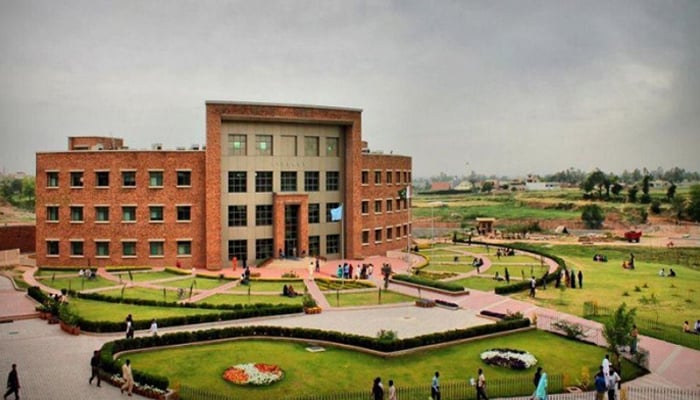Online course on SDGs through local actions held
Islamabad : Department of Anthropology, Quaid-i-Azam University, conducted an online course on ‘Achieving United Nation’ Sustainable Development Goals (SDGs): global goals through local actions.
The 5-day course was organised in partnership with The Knowledge Executive (TKE) and Development Impact Solutions (DIS).
The initiative provided 25 participants from development sector, members of civil society organisations, faculty and students with an opportunity to learn about sustainable development.
The participants remained engaged with global faculty comprising experts including Dr Robertson Work Jr from New York, Fayyaz Baqir from Ottawa, Dr Saba Gul Khattak and Salma Jafar from Islamabad, Donglin Li from Beijing, Dr Saifullah Chaudhry and Dr Faisal Shaheen from Toronto, Jennifer Bennett from Edmonton. Each expert led sessions that illuminated the path toward achieving the SDGs, empowering participants to think critically and act decisively by drawing lessons from local successes to tackle global challenges.
A key feature of the course was the unpacking of successful Pakistani case studies recognised globally as success stories, providing insights into how to operationalise the SDGs. Some of these acclaimed initiatives included the Aga Khan Rural Support Program (AKRSP) model in Gilgit-Baltistan, which aimed at addressing poverty and hunger (SDG 1 & 2), the Orangi Pilot Project (OPP) in Karachi, which focused on improving health and sanitation (SDG 3 & 6) and the child labour in the Sialkot soccer ball industry and the "Cash for Work" project in Pakistan, both addressing decent work and economic growth (SDG 8). Furthermore, the model of care was utilised to exemplify education for marginalised communities under SDG 4.
The certificate course also highlighted how increasing women’s representation in legislation paved the way for women-friendly legislation in Pakistan (SDG 5). Together, these initiatives demonstrate how local actions can align with and support global goals.
Dr Inam Ullah Legahri, Chairperson, Department of Anthropology, thanked the participants and speakers, stating that his Department provided a unique and innovative opportunity to members of civil society organisations, academics, researchers and students to learn from global experts on SDGs and how to operationalise them locally through successful Pakistani case studies.
-
 All You Need To Know Guide To Rosacea
All You Need To Know Guide To Rosacea -
 Princess Diana's Brother 'handed Over' Althorp House To Marion And Her Family
Princess Diana's Brother 'handed Over' Althorp House To Marion And Her Family -
 Trump Mobile T1 Phone Resurfaces With New Specs, Higher Price
Trump Mobile T1 Phone Resurfaces With New Specs, Higher Price -
 Factory Explosion In North China Leaves Eight Dead
Factory Explosion In North China Leaves Eight Dead -
 Blac Chyna Opens Up About Her Kids: ‘Disturb Their Inner Child'
Blac Chyna Opens Up About Her Kids: ‘Disturb Their Inner Child' -
 Winter Olympics 2026: Milan Protestors Rally Against The Games As Environmentally, Economically ‘unsustainable’
Winter Olympics 2026: Milan Protestors Rally Against The Games As Environmentally, Economically ‘unsustainable’ -
 How Long Is The Super Bowl? Average Game Time And Halftime Show Explained
How Long Is The Super Bowl? Average Game Time And Halftime Show Explained -
 Natasha Bure Makes Stunning Confession About Her Marriage To Bradley Steven Perry
Natasha Bure Makes Stunning Confession About Her Marriage To Bradley Steven Perry -
 ChatGPT Caricature Prompts Are Going Viral. Here’s List You Must Try
ChatGPT Caricature Prompts Are Going Viral. Here’s List You Must Try -
 James Pearce Jr. Arrested In Florida After Alleged Domestic Dispute, Falcons Respond
James Pearce Jr. Arrested In Florida After Alleged Domestic Dispute, Falcons Respond -
 Cavaliers Vs Kings: James Harden Shines Late In Cleveland Debut Win
Cavaliers Vs Kings: James Harden Shines Late In Cleveland Debut Win -
 2026 Winter Olympics Snowboarding: Su Yiming Wins Bronze And Completes Medal Set
2026 Winter Olympics Snowboarding: Su Yiming Wins Bronze And Completes Medal Set -
 Trump Hosts Honduran President Nasry Asfura At Mar-a-Lago To Discuss Trade, Security
Trump Hosts Honduran President Nasry Asfura At Mar-a-Lago To Discuss Trade, Security -
 Cuba-Canada Travel Advisory Raises Concerns As Visitor Numbers Decline
Cuba-Canada Travel Advisory Raises Concerns As Visitor Numbers Decline -
 Anthropic Buys 'Super Bowl' Ads To Slam OpenAI’s ChatGPT Ad Strategy
Anthropic Buys 'Super Bowl' Ads To Slam OpenAI’s ChatGPT Ad Strategy -
 Prevent Cancer With These Simple Lifestyle Changes
Prevent Cancer With These Simple Lifestyle Changes




